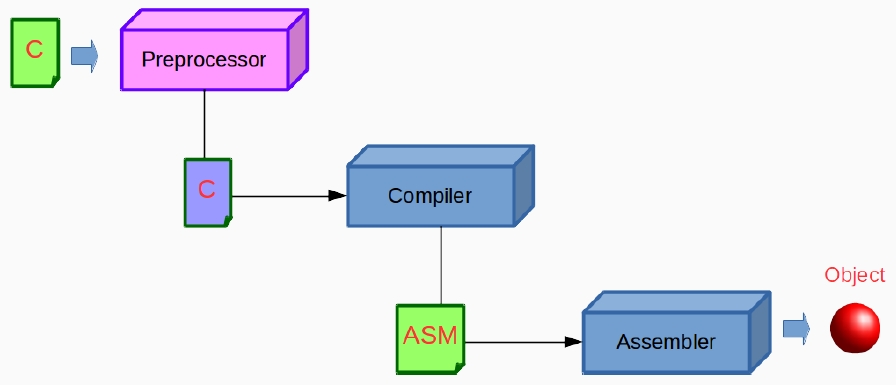Preprocessor 預處理器
- 在編譯器將您的源代碼編譯為組語前,還有一個稱為預處理的附加階段。
- Objective: Produce a source code file with preprocessing commands properly sorted out.

- Preprocessor commands are known as Directives.
- Preprocessor provides certain features, which are called preprocessor directives.
- Preprocessor directive 以
#為開頭。(例如:#include <stdio.h>) - Preprocessor directives 可以被放在程式中的任何地方。但建議放在開頭,並且每個必須獨立一行。
| |
- 以
gcc -E main.c查看預處理後的狀態。
Macro 巨集
#defineis known as macro expansion.- General Form:
#define macro_template macro_expansion
Macro Expansion
- Preprocessor searches for macro definition.
- After finding macro definition, it searches the whole program for macro_template.
- Replace every macro_template with macro_expansion.
- Replacement will not occur if the template is in a quoted string.
- Notes:
- 通常 macro_template 會使用大寫字母
- 不要使用分號
;
- 為什麼要用巨集?
- 為了寫出更高效率的程式。
- 提高程式的可讀性。
- 定義的巨集名稱可作為其他定義的一部分。
- 巨集可以像函式一樣擁有 arguments。
- Notes:
- 在定義巨集時,參數和名稱之間不允許有空格。
- Macro expansions 應該用括號括起來。
- 使用
\將巨集拆分為多行。
Macro vs. Function
Macro
- 單純替換
- 雖然你可能沒感覺,但比函式更快。
Function
- 傳遞參數 -> 執行 -> 回傳結果
- 支援遞迴
inline Functions
inlineis a CPP keyword.- C includes this keyword from C99. Though GNU C (and some other compilers) had inline functions long before standard C.
- Comparison:
- inline is just a suggestion.
- inline will check types.
- I will not talk too much about this keyword since it is different from CPP. I do not want to mislead you.
- If you are interested in this topic, please read here.
File Inclusion
- Why File Inclusion?
- Divide a program in multiple files.
- Each file contains related functions.
- How to classify functions. Up to you.
- Some functions or macros are required in lot of programs.
- Put them in a file. Make them a library.
- Include them when you need them.
- Divide a program in multiple files.
- What does Inclusion Mean?
- Nothing but simply copy and paste.
- Nested Inclusion is supported.
Conditional Compilation
- Write one code to run on different environments.
#if: if.#else: else.#elif: else if.#endif: end if.#ifdef: if defined.#ifndef: if not defined.
ifdef and endif
| |
- 如果 macroname 被定義了,那麼
#ifdef和#endif之間的程式將被執行。 - 範例:
1 2 3 4#ifndef TEST_H #define TEST_H ... #endif- 但也可用
#pragma once
- 但也可用
gcc -D OS_LINUX os_dependent.c-D: Predefine name as a macro, with definition 1.- So one code can be executed on different OSs. What you need to do is to build your code with different definitions.
- This is a very useful technique. Let’s see a real case (cJSON).
- 請自行去了解
#及##在巨集中的作用。